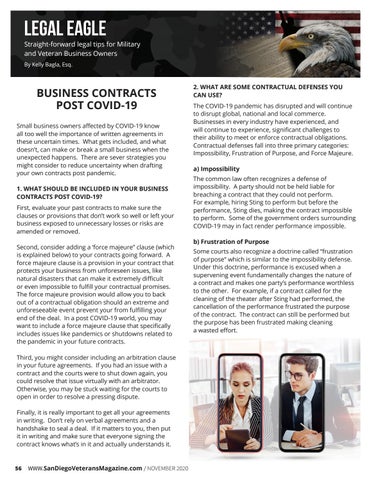legal Eagle Straight-forward legal tips for Military and Veteran Business Owners By Kelly Bagla, Esq.
BUSINESS CONTRACTS POST COVID-19 Small business owners affected by COVID-19 know all too well the importance of written agreements in these uncertain times. What gets included, and what doesn’t, can make or break a small business when the unexpected happens. There are sever strategies you might consider to reduce uncertainty when drafting your own contracts post pandemic. 1. WHAT SHOULD BE INCLUDED IN YOUR BUSINESS CONTRACTS POST COVID-19? First, evaluate your past contracts to make sure the clauses or provisions that don’t work so well or left your business exposed to unnecessary losses or risks are amended or removed. Second, consider adding a ‘force majeure” clause (which is explained below) to your contracts going forward. A force majeure clause is a provision in your contract that protects your business from unforeseen issues, like natural disasters that can make it extremely difficult or even impossible to fulfill your contractual promises. The force majeure provision would allow you to back out of a contractual obligation should an extreme and unforeseeable event prevent your from fulfilling your end of the deal. In a post COVID-19 world, you may want to include a force majeure clause that specifically includes issues like pandemics or shutdowns related to the pandemic in your future contracts. Third, you might consider including an arbitration clause in your future agreements. If you had an issue with a contract and the courts were to shut down again, you could resolve that issue virtually with an arbitrator. Otherwise, you may be stuck waiting for the courts to open in order to resolve a pressing dispute. Finally, it is really important to get all your agreements in writing. Don’t rely on verbal agreements and a handshake to seal a deal. If it matters to you, then put it in writing and make sure that everyone signing the contract knows what’s in it and actually understands it.
56
WWW.SanDiegoVeteransMagazine.com / NOVEMBER 2020
2. WHAT ARE SOME CONTRACTUAL DEFENSES YOU CAN USE? The COVID-19 pandemic has disrupted and will continue to disrupt global, national and local commerce. Businesses in every industry have experienced, and will continue to experience, significant challenges to their ability to meet or enforce contractual obligations. Contractual defenses fall into three primary categories: Impossibility, Frustration of Purpose, and Force Majeure. a) Impossibility The common law often recognizes a defense of impossibility. A party should not be held liable for breaching a contract that they could not perform. For example, hiring Sting to perform but before the performance, Sting dies, making the contract impossible to perform. Some of the government orders surrounding COVID-19 may in fact render performance impossible. b) Frustration of Purpose Some courts also recognize a doctrine called “frustration of purpose” which is similar to the impossibility defense. Under this doctrine, performance is excused when a supervening event fundamentally changes the nature of a contract and makes one party’s performance worthless to the other. For example, if a contract called for the cleaning of the theater after Sting had performed, the cancellation of the performance frustrated the purpose of the contract. The contract can still be performed but the purpose has been frustrated making cleaning a wasted effort.
